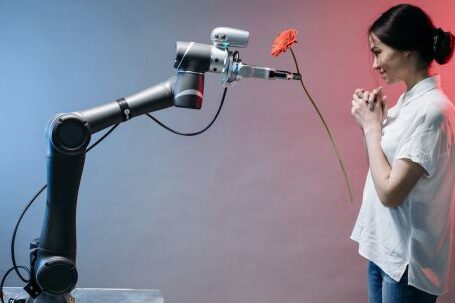Artificial Intelligence (AI) has emerged as a groundbreaking technology that is reshaping industries and revolutionizing the way we live and work. From self-driving cars to virtual assistants, AI is permeating every aspect of our lives and opening up new frontiers of innovation. In this article, we will explore the transformative potential of AI and the impact it is having on various sectors.
Unleashing the Power of AI
AI has the ability to process vast amounts of data and perform complex tasks with remarkable speed and accuracy. This makes it particularly useful in areas where human capabilities are limited. For instance, in healthcare, AI-powered systems can analyze medical records, identify patterns, and assist doctors in making accurate diagnoses. Similarly, in finance, AI algorithms can analyze market trends, predict stock prices, and make investment decisions in real-time.
Enhancing Customer Experiences
One of the key areas where AI is making a significant impact is in enhancing customer experiences. With the ability to analyze customer data and preferences, AI-powered systems can offer personalized recommendations and tailor-made services. For example, e-commerce platforms are using AI to analyze customer browsing behavior and provide personalized product recommendations. Virtual assistants, powered by AI, can understand natural language and provide instant customer support, improving overall customer satisfaction.
Transforming Manufacturing and Automation
AI is also reshaping the manufacturing industry by enabling automation and improving efficiency. Intelligent robots equipped with AI algorithms can perform repetitive tasks with precision and accuracy, freeing up human workers for more complex and creative endeavors. AI-powered machines can also analyze production data in real-time, identify defects, and optimize production processes, leading to improved quality and reduced costs.
Revolutionizing Transportation
Transportation is another sector that is being revolutionized by AI. Self-driving cars, powered by AI, have the potential to transform the way we commute, making transportation safer, more efficient, and environmentally friendly. AI algorithms can analyze real-time traffic data, optimize routes, and predict traffic congestion, reducing travel time and fuel consumption. Furthermore, AI-powered drones are being used for delivery services, providing faster and more cost-effective solutions.
Ethical Considerations and Challenges
While AI holds great promise, it also raises ethical considerations and challenges. The use of AI in decision-making processes, such as hiring or loan approvals, can introduce biases and discrimination if not properly regulated. There are also concerns about the impact of AI on employment, as automation could potentially replace human workers in various industries. Additionally, there are concerns around data privacy and security, as AI systems rely on vast amounts of data to function effectively.
The Future of AI
As AI continues to advance, the possibilities for innovation seem limitless. From healthcare to finance, manufacturing to transportation, AI is transforming industries and opening up new avenues for growth. However, to fully realize the potential of AI, it is crucial to address the ethical implications and ensure that AI is developed and deployed responsibly.
In conclusion, AI is the new frontier of innovation, reshaping industries and revolutionizing the way we live and work. With its ability to process vast amounts of data and perform complex tasks, AI is enhancing customer experiences, transforming manufacturing and automation, and revolutionizing transportation. However, ethical considerations and challenges need to be addressed to ensure the responsible development and deployment of AI. The future of AI holds great promise, and it is up to us to harness its potential for the benefit of society.





